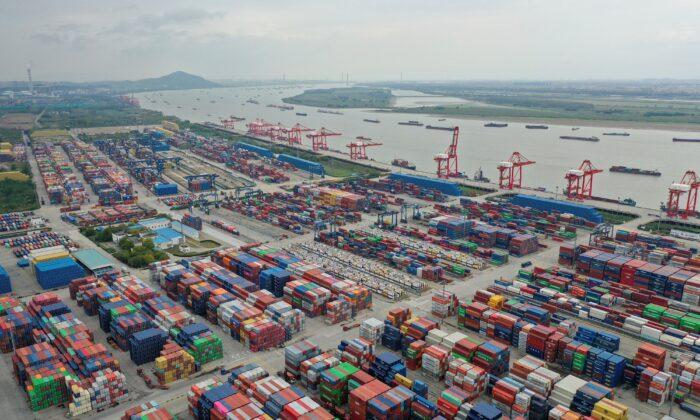BEIJING—China’s trade contracted again in January and February as U.S. and European demand weakened in the face of interest rate hikes.
Exports sank 6.8 percent from a year earlier to $506.3 billion, an improvement over December’s 10.1 percent decline, customs data showed Tuesday. Imports fell 10.2 percent to $389.4 billion, deepening December’s 7.3 percent contraction.
China’s global trade surplus for the two months edged up 0.8 percent over a year earlier to $116.9 billion.
Forecasters expected trade to weaken as the likelihood of a recession in Western economies increased following rate hikes by the Federal Reserve and European Central Bank to cool economic activity and record-setting inflation.
“We don’t expect exports to rebound,” Iris Pang of ING said in a report.
Retail sales and other activity have started to improve after anti-virus restrictions that kept millions of people at home and temporarily shut down Shanghai and other industrial centers were lifted in December.
The economy also is under pressure from tighter controls on debt, which triggered a slump in China’s vast real estate industry and the economy in mid-2021.
China reports January and February trade data together to screen out the effect of the Lunar New Year holiday, which begins at different times each year during those two months. Factories shut down for up to two weeks.
Exports to the United States tumbled 21.8 percent from a year earlier to $71.6 billion following repeated rate hikes by the Federal Reserve to cool economic activity and surging inflation. Imports of American goods fell 5 percent to $30.3 billion.
The politically sensitive trade surplus with the United States narrowed by 30.9 percent to $41.3 billion.
Imports from Russia, mostly oil and gas, surged 31.3 percent over a year ago to $18.6 billion. Exports to Russia rose 19.8 percent to $15 billion.
China, the biggest global energy consumer, has stepped up purchases from Russia to take advantage of price discounts after Washington, Europe, and Japan cut imports to punish President Vladimir Putin’s government for its attack on Ukraine.
China can buy Russian oil and gas without triggering Western sanctions, but Biden has warned Beijing against helping Moscow’s military. China bought about 20 percent of Russia’s crude exports in 2021 and increased that last year.





